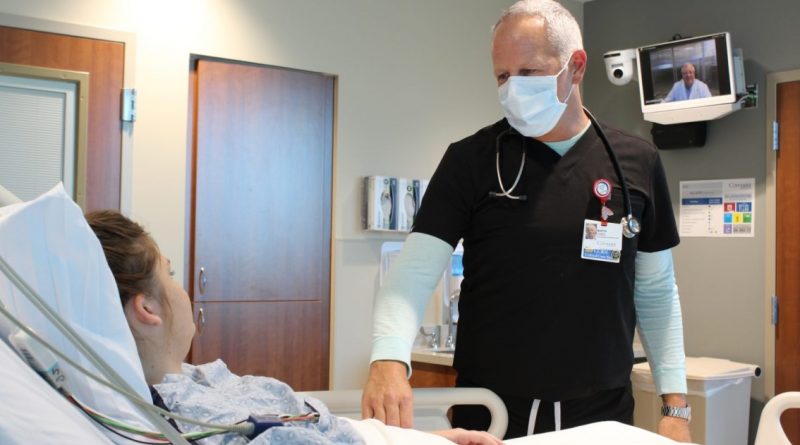Covenant Health uses telemedicine to get specialists to rural areas – and much more
Photo: Covenant Health
Covenant Health, a health system based in Knoxville, Tennessee, had a problem with telemedicine – a lack of physician specialists needed in rural communities.
THE PROBLEM
Covenant Health began its journey with telehealth a decade prior to the COVID-19 pandemic and served as a pioneer in the region in virtual care. The health system’s telehealth stroke program was begun in 2012, developing the region’s first comprehensive stroke center.
“This technology, coupled with virtual viewing of medical imaging, allowed Covenant Health neuro-hospitalists to assist ED physicians with rapid diagnoses and urgent treatment of stroke patients,” said Dr. Mandy Halford, senior vice president and chief medical informatics officer at Covenant Health.
“Additionally, assistance was gained in coordination of referrals to Covenant Health’s comprehensive stroke center for advanced treatment with our neuro-interventional radiologists, if needed,” she continued. “It was evident that this worked well for stroke care, thus steps were taken to expand to other specialties for ED and inpatient virtual care consultation, well ahead of the COVID-19 pandemic.”
With the rise of consumerism in healthcare and the criticality of the COVID-19 pandemic, Covenant Health became more agile in virtual care implementation. Additional services were implemented, across all venues of care, many of which focused on care in the convenience of the patient’s own home.
“For ambulatory services, primary care and specialty scheduled virtual visits were implemented and offered,” Vice President of Clinical Informatics Tiffany Cross said. “At the same time, 24/7 direct-to-consumer virtual urgent care visits were established. These advances were activated through partnerships with three vendors.”
For hospitalized patients, telehealth expanded to critical care services and implementation of tele-ICU across the east Tennessee region, Vice President of Clinical Informatics Chris Skinner said.
“This effort helped Covenant Health deliver the highest level of critical care services during the region’s biggest time of need, right as Delta and Omicron COVID variants hit area communities,” Skinner added.
PROPOSAL
Early on during Covenant Health’s telehealth journey, many vendors showcased products that met the virtual care need; however, many were not integrated into the day-to-day clinician workflows, Halford observed.
“We are strong believers that telemedicine should be seen as another tool to deliver care and should be an integral part of the overall clinical workflow, in all venues of care,” she explained. “For the majority of Covenant Health’s virtual care service lines, this virtual care technology is embedded directly into the EHR workflow.
“We aim to provide convenient, high-quality, affordable care, and we are able to deliver on our company pledge of putting patients first by incorporating virtual care in all strategic plans,” she continued. “We have seen that this reliable and innovative technology allows our teams to expand services to their patient populations and we continue to see a growth in virtual care volumes year to year.”
RESULTS
The health system continues to see improvements in patient outcomes with the use of virtual care.
“In the behavioral health outpatient setting, we have been able to implement individual and group therapy virtual health visits and have seen a decrease in no-shows and associated improvement in the overall care plan,” Halford reported.
“For behavioral health needs in the hospital setting, we have implemented ED and inpatient virtual care consultations and have seen an improvement in support for ED patients and improvement in transition of care to the behavioral health hospital, when deemed appropriate,” she continued.
For primary care, the health system is delivering services via remote technologies for chronic care management and continues to see improvements in goals of care. In tele-ICU, as there is collaboration with the bedside team, the organization has seen improvements in ventilator management, quality of care and ICU length of stay.
“As virtual care volumes continue to expand across all service lines, we will continue to excel on our pledge of excellence by putting our patients first and focus on additional success metrics,” Halford added.
USING FCC AWARD FUNDS
Covenant Health was awarded $987,991 by the FCC telehealth grant program. It used FCC telehealth award funds to expand its telehealth infrastructure, allowing expansion across all venues of care for the community.
“We focused on patient care coordination across the continuum of care, including virtual care, secure texting and communications to further improve the seamless digital patient experience,” Halford concluded. “The future of medicine will combine more robust virtual care services with innovative advancements in healthcare technology and we plan to continue to build off of our current infrastructure to meet the future demands.”
Twitter: @SiwickiHealthIT
Email the writer: [email protected]
Healthcare IT News is a HIMSS Media publication.
Source: Read Full Article



